Putin’s “bluff”: a cautionary note about underestimating the possibility of nuclear escalation in Ukraine
By Stephen J. Cimbala, Lawrence J. Korb | October 2, 2023
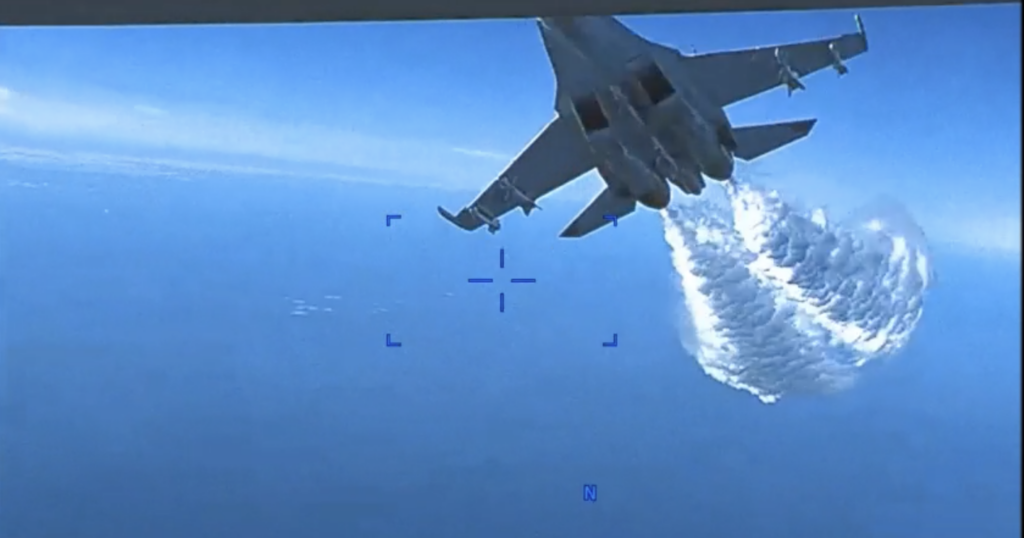 This screen shot from a US Defense Department video clip shows a Russian Su-27 fighter jet flying near an American Reaper drone in March, over the Black Sea near Crimea, spraying what the Defense Department says is jet fuel.
This screen shot from a US Defense Department video clip shows a Russian Su-27 fighter jet flying near an American Reaper drone in March, over the Black Sea near Crimea, spraying what the Defense Department says is jet fuel.
Timothy Snyder, the widely acclaimed Yale University historian and expert on conflict in the bloodlands of Central and Eastern Europe, recently wrote an important essay on the status of the war in Ukraine. It offers an insightful analysis of the reasons why the United States and NATO must continue to support Ukraine in its resistance to Russian aggression. He contends that calls for a negotiated settlement of the conflict are premature, and that only a decisive victory for Ukraine will provide a lasting peace and deter Russia from further aggression. As he points out:
The Ukrainians are defending the legal order established after the Second World War. They have performed the entire NATO mission of absorbing and reversing an attack by Russia with a tiny percentage of NATO military budgets and zero losses from NATO members. Ukrainians are making a war in the Pacific much less likely by demonstrating to China that offensive operations are harder than they seem.
Snyder has become a leading Western interpreter of the Russian invasion and Russian President Vladimir Putin’s psyche, writing and speaking widely, including to the United Nations. Despite the soundness of his analysis of the current situation with respect to fighting the conventional war in Ukraine, however, Snyder dismisses too abruptly the possibility of Russian escalation to nuclear weapons use. In his judgment, the “nuclear bluff” from Moscow “has largely worn itself out,” and the argument that Russia could escalate is a triumph of Russian propaganda; he contends that a more robust Ukrainian conventional military offensive will actually make nuclear war less likely by “demonstrating that nuclear blackmail need not work.”
The arguments of Snyder (and others) assume that the United States and NATO have fallen victim to “analysis paralysis” that has created unnecessary concern about escalation, thereby forestalling timely increases in weapons such as longer range missiles, combat aircraft, and other requirements for a more robust counteroffensive against Russian defenses in eastern and southern Ukraine.[1] From this perspective, the United States and NATO should provide as much additional support as quickly as possible to enable a decisive Ukrainian military victory, notwithstanding Russian nuclear coercive diplomacy. Deep-strike systems and information networks provided by Ukrainian allies should, this argument suggests, enable Kiev to strike critical targets inside Russia, including command-control systems, logistics, and military bases and installations, bringing home to Russians some of the costs that Russia has inflicted on Ukrainian forces and civilian infrastructure.[2]
We have three major concerns about this optimism in regard to nuclear risk—concerns that should be loudly raised by policy makers, analysts, and media commentators. First, the United States and NATO cannot and should not assume that Russian reasoning about nuclear deterrence and escalation will follow a logic similar to that of their Western counterparts.[3] Second, escalation need not be the outcome of deliberate forethought: Inadvertent escalation could lead to a crossing of the nuclear threshold under circumstances that were not planned for or foreseen. And third, no one should underestimate what Ukraine and NATO have already accomplished in this war, both in terms of strategy and in policy—significant accomplishments won without provoking nuclear escalation.
The first concern is that Vladimir Putin’s risk assessment might be different than what NATO observers predict. As US Army Lt. Col. Brandon Colas has noted, from the perspective of what behavioral psychologists call prospect theory, decision makers are more likely to take larger risks to avoid a significant loss than they would to achieve a gain of similar proportions.[4] In this regard, some US and NATO messaging since the beginning of Russia’s invasion of Ukraine may have the unintended effect of lowering Russia’s threshold for the first use of non-strategic nuclear weapons. Examples include messaging that: conveys ambiguity about a US or NATO response to Russian nuclear first use; implies that a Russian loss in the war against Ukraine will cause the end of Putin’s regime; or suggests that Russia will lose great power status in the aftermath of a conventional military defeat. From Putin’s perspective, the use of nonstrategic nuclear weapons could restore the deterrent credibility lost from the failure of Russia’s conventional military power, remind the world that Russia is still a great power, and shake up expectations about Russia relative to the existing international order.[5]
The second concern involves the possibility of inadvertent escalation that results from the fracas of conventional war and the behavior of military forces in conflict zones. For example, US leaders have complained that Russian military aircraft are repeatedly taking “batting practice” against American military airplanes near the conflict zone in and around Ukraine. This includes dangerous fly-bys, jinking and spoofing the opposition with provocative aeronautics and near-miss collisions.
Also, there’s an interesting feature of Russia’s nonstrategic nuclear weapons inventory: The majority of their so-called tactical nuclear weapons are actually assigned to the Russian navy instead of the ground or air forces. Therefore, the possibility of incidents at sea involving one or more nuclear-armed combatants cannot be ruled out. Russia’s recent escalation of its war against civilian shipping in the Black Sea, aiming to deprive Ukraine of its grain exports, creates additional risks of a Russia–Ukraine or NATO–Russia contretemps at sea. Presumably Russian (and NATO) nuclear weapons are kept under positive controls even after having been deployed with forward forces. But sometimes navy admirals and captains are not as easily tethered to higher-echelon micromanagement as are leaders in other branches of the armed services. It is important to remember that, during the Cuban missile crisis of 1962, a Soviet submarine commander almost fired a nuclear armed torpedo in response to US depth charges; he was stopped by the executive officer on the boat, whose concurrence was required.
A third factor weighing against demands for an absolute Ukrainian military victory lies in the recognition that Russia has already suffered a strategic political defeat. Instead of dividing and weakening NATO, Russia’s invasion of Ukraine has had the opposite effect. NATO is stronger than any time since the end of the Cold War and has added to its membership the formerly neutral states of Finland and Sweden. Putin has also been branded as an international war criminal and is reluctant to travel anywhere outside of Russia. Following the debacle of the Wagner group uprising, Russia’s internal solidarity is full of question marks (notwithstanding the brutal demise of former Putin crony Yevgeny Prigozhin). Admittedly, China and North Korea still support Russia with military aid and political expressions of solidarity, and Russia sees the BRICS forum as an opening for increasing its global influence. Nonetheless, in a best case for Russia in Ukraine, it will have to settle for a negotiated cease fire and a peace agreement that leaves it with less territory in Ukraine than it has occupied—or, even worse, to continue with an extended war that drains its economic resources and military power.
US and NATO aspirations for a Ukrainian military victory are understandable and laudable. But concerns about the possibility of nuclear escalation are not to be dismissed, and they go beyond accepting any obviously tendentious Russian propaganda. In addition to high-end conventional military performance by Ukraine and NATO political unity, another requirement for success in defending Ukraine is escalation control. Russian nuclear threats should not paralyze Ukrainian or NATO determination to persevere in the conventional war, which has existential stakes for Western democracy. But Western leaders should also remember that war is the least predictable of human activities, and nuclear war has unacceptable and irreversible consequences for all of humanity.
Notes
[1] See, for example: Anne Applebaum, “Fear of Nuclear War Has Warped the West’s Ukraine Strategy,” The Atlantic, November 7, 2022, https://www.theatlantic.com/
[2] See, for example: “Ukraine Strikes Headquarters of Russia’s Black Sea Fleet,” New York Times, September 13, 2023, https://www.nytimes.com/live/2023/09/13/world-russia-ukraine-news
[3] Stephen Blank, “Nuclear Weapons in Russia’s War Against Ukraine,” Naval War College Review, v. 75, no. 4 (Autumn 2022), pp. 53-78.
[4] Brandon Colas, “A Rational Choice? Russia’s Potential Use of Nonstrategic Nuclear Weapons,” Aether, V. 2, no. 2 (Summer, 2023), pp. 18-30.
[5] Ibid.
Together, we make the world safer.
The Bulletin elevates expert voices above the noise. But as an independent nonprofit organization, our operations depend on the support of readers like you. Help us continue to deliver quality journalism that holds leaders accountable. Your support of our work at any level is important. In return, we promise our coverage will be understandable, influential, vigilant, solution-oriented, and fair-minded. Together we can make a difference.
Keywords: NATO, Russia, Timothy Snyder, Ukraine, inadvertent excalation, nuclear escalation
Topics: Nuclear Risk, Nuclear Weapons



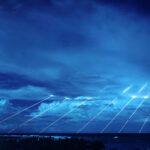

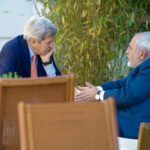
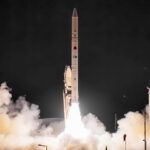
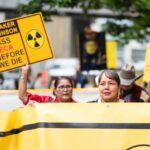




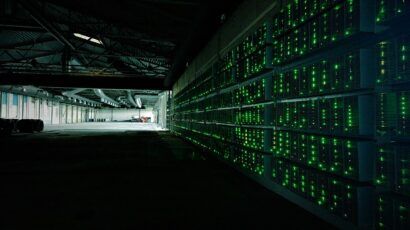
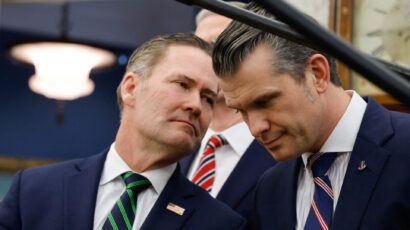
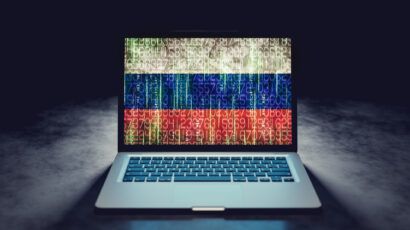

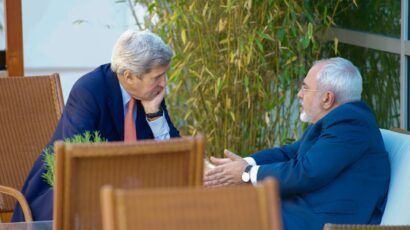
Like Timothy Snyder, I have dismissed Putin nuclear shenanigans as bluff from day one (See my two nofirstuse.global blog pieces). I also was hopeful that Putin was beginning to appreciate that he had milked it for about all it was worth. Unfortunately, according to recent reports, he seems to be trying to breath new life into his threats by having Russians practice nuclear air-raid drills. Using the Russian populace as a pawn in his bluff is dispicable; especially for Russian youth who had every right to believe the threat of nuclear war was a thing of the past. Are they… Read more »
This article quotes only pro-Ukrainian and pro-Western experts (representing less than 15% of the population’s planet) but doesn’t mention for the balance any other prominent experts, including US university professors, former CIA and military experts, and public figures whose opinions are different. The summary was recently presented on antiwar.com, the American Thinker, and other respected media, and it blames the NATO expansion as the main factor in the current crisis. New York Democratic senator Daniel Patrick Moynihan said back in 1988 that NATO expansion “Opens the door to nuclear war”, and he was absolutely right. For the record, I have… Read more »
There are potential red lines where nuclear weapons use becomes likely. Crimea has been part of Russia since Katherine the Great and a central part of Russian history since the 1700s. In 1954 Khrushchev transferred it to Ukraine when everything was part of the former Soviet Union. Nobody thought anything about it because the same people were in control–some internal politics drove that decision. Long-term peace is much more likely if the Crimea is Russian and the rest of the territory goes back to Ukraine. Ignoring history is very dangerous.
Unfortunately, Russia would never walk away with only Crimea. Some of us in the west think we can predict what Putin will do under certain circumstances.That’s a complete fallacy. You can’t predict the actions of a madman, even when he exhibits a thin veneer of sanity.
Extremely disappointed to find this pro possibly nuclear war propaganda in the Bulletin, of all places. Russia is acting in self-defense.
I agree with the articles premise which is clearly stated in the title. In fact excellent article. Kudos. You recall what McNamara said before he passed that the reason our civilazation is still here is an unmistakable accident. It was an accident it did not end in 1962 during the Cuban Missile Crisis. You might call it luck or borrowed time. You realize what Carl Sagan said about MAD still goes today. “Mutual assured destruction is like two implacable enemies waist deep in gasoline one with seven matches and the other with five matches a situation that if it wasn’t… Read more »
This article is delusional. By what measure has Russia suffered a strategic defeat? The Russian objective has been substantially achieved. Crimea has been retained and their is now a land bridge and buffer between Crimea and Ukraine. Crimea was by far the most strategic asset the Russians wanted to maintain, if they lost Crimea they would lose access to a warm water port and that port would have become a NATO asset. That is why NATO is so concerned that Zelesnky did not throw everything the Ukrainian military had against the south and instead frittered away forces on Bakhmut and… Read more »